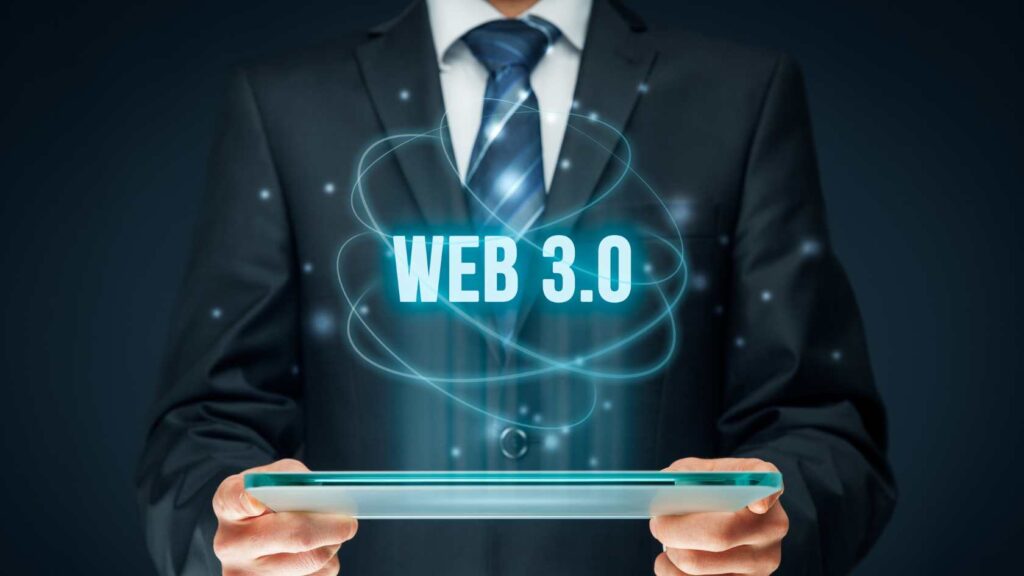The Internet is constantly in flux, often making standard digital marketing practices difficult. Trends are continually changing and continuously evolving, leaving us marketers to pick up the pieces and figure out – what works.
Before Instagram and YouTube Shorts provided brands with new and exciting ways to connect with the world, we made commercials and banner advertisements to be seen by our prospects. It was like fishing for a goldfish in the ocean, hoping one would swim by at the right time.
Enter: Web 3.0

Web 3.0 is the most recent step in the structure of the Internet, which is the next primary thing marketing professionals must navigate to increase their business’ revenue effectively.
While not fully fleshed out, we witness Web 3.0 practices being toyed with more and more in the daily online landscape. The focus of Web 3.0 is the interaction between humans and machines. The Web is growing in intelligence, a stimulating and terrifying thought. Web 3.0 embraces technological advances and pushes the limits of what we know as normal today.
Increased Privacy Means Less Data

As a marketer today, you can go to Google Trends or Facebook Suite and scrutinise precisely who is consuming your content and where they tend to be found online. It’s an integral part of sharing your content through paid advertising that we’ve grown habituated to in the world of Web 2.0.
This data is often bought in bulk or included in your subscriptions to these services. The data is not just critical to your current marketing efforts; it’s actually the backbone of the marketing campaigns.
Web 3.0 offers better governance over data privacy and security and helps deliver a more personalised user experience.
For instance, leading web browsers will remove third-party cookies by 2024 (as per the latest news), making it more difficult for marketers to target distinctive audiences. Cookies are used to collect data about people’s online behaviours. The information gathered is employed for targeted advertising and other marketing objectives. Without this valuable data, marketers will have more difficulty understanding their audiences and delivering relevant content.
How Will Web 3.0 Transform The Digital Marketing Industry?

Web 3.0 transforms digital marketing with its blockchain technologies, transparency, and data privacy. It also gives marketers various opportunities to build customer trust and connections. User-generated content, data ownership, and decentralised resources are substantials of these opportunities.
Some transformations in Digital Marketing due to Web 3.0 are:
- User-generated content will get a higher bias in Digital Marketing.
- The users will own their data and be responsible for their Privacy.
- Virtual communities will play a more significant role.
- Advanced experiences will be influential.
- Digital marketing will use more decentralised apps (dApps).
- Artificial intelligence and the Semantic Web will get more weightage.
User-Generated Content (UGC) In Digital Marketing

Marketers will need to leverage diverse user data sources to effectively target audiences, as third-party cookies will no longer be available. This change could push marketers to create more personalised and targeted content.
UGC entitles customers to participate in a brand’s growth instead of being spectators. UGC impacts brand loyalty and association in a big way because people thrive off being part of something greater than themselves, and developing UGC allow them to be part of a brand’s community.
In Web 3.0, UGC has become more and more valuable. Users are vital in this version due to virtual currencies, content ownership, and platforms’ shared positions.
So, digital marketing must transform itself for this new scenario. This version of the Web enables users to create networks with any device. Hence, digital marketers should use this opportunity and integrate the users as content creators into their campaigns to reach more customers.
Getting more UGC and giving credit to it will establish a trusting and authentic relationship between marketers and their target customers.
The Users Will Own Their Data And Keep Their Privacy

Web 3.0 will drive improved user experience, requiring marketers to revisit their digital marketing strategies for acquiring and engaging customers. Users will be more autonomous in Web 3.0; that’s a reality. Decentralisation will transform how marketers gather and store data. The responsibility for owning personal data will be on the user with the right to sell or trade it.
The method of collecting and storing users’ data will transform. Similarly, targeting and personalisation will also be impacted by privacy regulations.
Virtual Communities Will Step Forth

Web 3.0 focuses on the users’ interaction and extends the association. It will take virtual communities and social associations to new pinnacles while giving users more power and autonomy than Web 2.0. Therefore, virtual communities will be more influential as the communication and interaction between individuals augment.
Marketers should enter the channels to reach these virtual communities and access their customers. These changes will be swift, and marketers should research and learn the foundations of Web 3.0.
Advanced Experiences Will Be Substantial

In the age of Web 3.0, Digital Marketers have to focus on advanced user experiences like interactivity and 3D as they will become the most vital feature of this new world. Customers want to have memorable and exceptional experiences. So digital marketing should offer them the desired experience through VR/AR and Metaverse.
Virtual experiences will connect the customers to the brand and bring the brand a step forward to its target audience.
Artificial Intelligence And The Semantic Web Will Takeover

Web 3.0 will require Digital Marketing to use artificial intelligence and the semantic Web effectively in a wide area. Marketers will have to use open data sources through artificial intelligence algorithms to target audiences since third-party cookies will not be available.
Hence, Digital Marketing will create more consistent and personalised content for its consumers using these algorithms. Further, the semantic Web helps Digital Marketing to shift from a broad perspective.
For example, a marketer can create content using a semantic approach for an entire topic with elements that will catch the prospective customers’ search. Thereby the marketers can understand consumer behaviours better and develop marketing strategies.
The Final Words
We are marching toward a future where people have absolute power and control over their data and Privacy. The final impression regarding the role of Web 3.0 for marketing showcases that customers would be at the forefront and their preferences.
The marketing landscape is changing rapidly, and businesses need to change. By understanding the trends shaping Web 3.0, brands can adapt their marketing strategies and stay ahead of the curve.
Eventually, Web 3.0 will encourage every brand and business to reorient itself.


